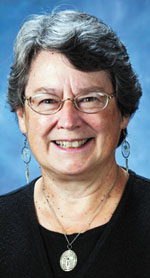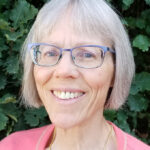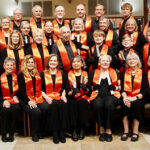By Lisa Powell, Reverend Kendra Thompson and Micah Kiel
Academia typically measures contributions to the theological discipline through one’s publications. Yet, if we only looked at published theological texts for our understanding of the faith tradition, we would falsely assume that women have not had theological ideas to contribute to the Christian faith until the 1970s, when women, previously barred from graduate institutions of theology, began graduating with doctorates and publishing in the discipline.

Theology is not only written in treatises and Summas. It is sometimes written in pamphlets and biographies, in letters, hymns and Catholic Messenger articles. It can be lived in committee meetings, kitchens, nurseries and classrooms. One task of feminist theology is to retrieve these forms of theology. This focus on the lived contribution to the faith isn’t an innovation, of course. After all, one of St. Augustine’s most influential texts in the history of Christianity is his autobiography, weaving together his conversion, his mystical experience and some basic theological principles in the “Confessions.” The best theological text is always the one lived and incarnated.
In honor of the retirement of Corinne Winter, a professor of theology at St. Ambrose University in Davenport, we offer this brief witness to her theological contribution.
One of the first words a student of biblical Hebrew learns is: hesed. It describes God’s loving kindness for the people and it carries a sense of constancy and faithfulness. In the book of Ruth, however, this word is used to describe the action of a human. Ruth exhibits God’s hesed through patience, loyalty, doggedness and compassion. In so doing, she hastens God’s plans on the earth. This word hesed could also describe Corinne in her many endeavors and roles — as the author of myriad articles in The Catholic Messenger, a department chair, mentor, adopted grandmother, teacher, friend, cook, wife, sister, daughter and aunt. Those who know Corinne know her to be steadfast in her commitment and her compassion.
Corinne’s pursuit of theological training was a brave response to a vocation that required her to be a trailblazer. Although some women religious began taking graduate theology courses as early as 1953, because they taught these courses at Catholic schools, women were only permitted to enroll in graduate courses in theology at schools like Notre Dame University and Marquette University beginning in 1969. Corinne graduated with her MA in theological studies from the University of Dayton in 1984, only three years after Elizabeth Johnson became the first woman to receive a Ph.D. in theology from Catholic University of America. Corinne went on to complete an MA and a Ph.D. in systematic theology from Notre Dame in 1995.
She embodies a theology that insists the image of God resides in women and men. One way she accomplishes this is through the feminist act of presence: the audacious act of placing one’s female body at the table where no woman has sat before or in a space that has been hostile to women. She took a seat in the department of theology in 1994 and positioned herself, however conspicuously, in the space of theological discussion. Corinne was the first woman hired in the theology department at St. Ambrose University, and also the first lay theologian. In her first years on the faculty, meetings were often held in the apartment of one of the resident priests, complete with cigarettes and scotch. But there she was, present and manifest. Most recently, Corinne has served as director of the Master of Pastoral Theology program at SAU, coordinating the program with the Diocese of Davenport to provide excellent theological and pastoral training for candidates of the diaconate. Her commitment to this program is a prime example of hesed, expressed in her tireless devotion to the theological preparation of deacons and their wives for service to the church.
A systematic theologian evaluates different interpretations of Christian doctrine. Corinne’s career has focused on promoting strands in the tradition that advocate the full flourishing of God’s creation, the dignity of each person and the abundance of God’s love and grace. She wrote her dissertation on the doctrine of the Trinity with the influential theologian Catherine LaCugna. LaCugna’s work highlights the dynamic relationship of diversity and equality within the being of God; community is the heart of God’s being, revealed to humanity as three “persons” working together in love for a common purpose — our salvation — which likewise demonstrates God’s intention for creation: community.
Corinne’s interest in the doctrine of the Trinity finds expression in the way she teaches, following the model above: promoting community, equality and diversity. The image most often given for a classroom in feminist theology is that of a round table. This pedagogy moves away from top-down styles of instruction, with one authoritative voice from the front addressing a room of passive recipients. Corinne shares her knowledge in dialogue with others, acknowledging the contributions of all gathered together to learn from one another in a communal task of interpretation. The metaphor of a table, and the generosity of spirit it evokes, fits Corinne’s lived theology. She never responds to a social invitation without offering: “What can I bring?”
Corinne Winter retires this month; her presence among the theology faculty at St. Ambrose University will surely be missed. But even so, an embodied, emancipatory theology continues in her friendships, in the community she fosters, and with the children she loves.
(Lisa Powell, Ph.D., Rev. Kendra Thompson, Micah Kiel, Ph.D., all teach at St. Ambrose University, Davenport.)











